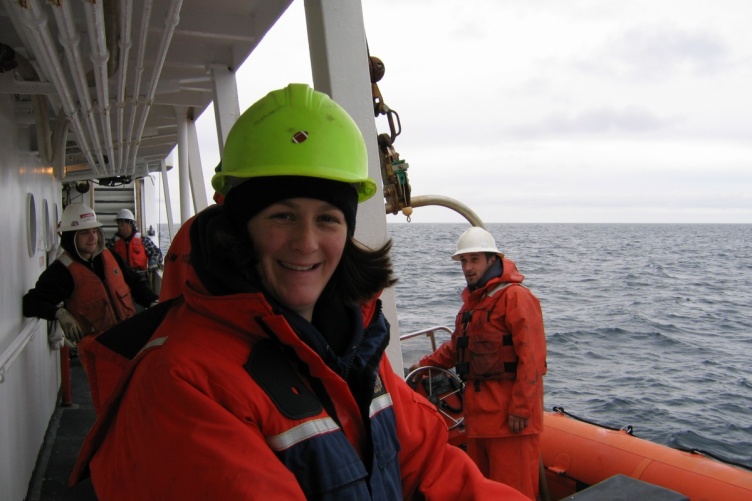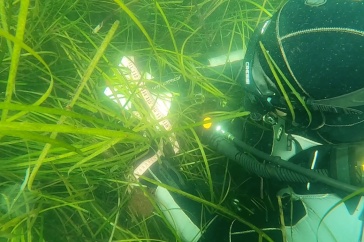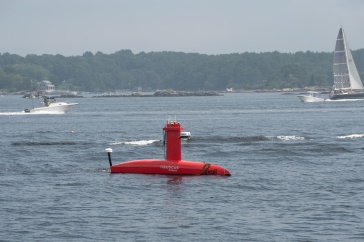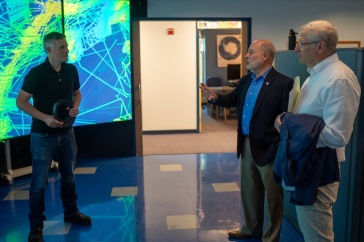
Jennifer Miksis-Olds, Director of the UNH Center for Acoustics Research and Education, in the field conducting acoustic research to develop a deeper understanding of the effect of human activity on soundscapes in the world's oceans.
Since the beginning of the Industrial Revolution, the world’s oceans have become substantially busier and noisier. Increased shipping, fishing and recreational crafts are just a few ways in which humans and their inventions have added to the noise levels.
New research indicates this escalation in sound can potentially have negative impacts on the ocean soundscape upon which marine life and its ecosystems rely. UNH scientists are part of the international team exploring possible solutions to reduce that noise and return the soundtrack of the healthy ocean.
"[This work] identifies ocean users that have already made a positive, progressive difference in addressing the challenge and proposes action that will guide future ocean users to being sound environmental stewards."
“What is unique about this work is that is goes beyond just pointing out and describing the societal concern of rising sound levels,” said Jennifer Miksis-Olds, research professor and director of UNH’s Center for Acoustics Research and Education. “It identifies ocean users that have already made a positive, progressive difference in addressing the challenge and proposes action that will guide future ocean users to being sound environmental stewards.”
The paper, published in the journal Science, brought together a global team of researchers to look at how changing ocean soundscapes affect wildlife, from invertebrates to whales. They gathered, assessed and consolidated evidence from more than 10,000 papers that see how anthrophony, or sounds generated by humans, can potentially adversely affect marine animals at multiple levels, including their behavior, physiology and, in extreme cases, survival.
“Underwater soundscapes are not an aspect of the ocean that people naturally relate to because humans are visual creatures, but sound is the dominant sensory mode for life underwater, and the masking of biologically significant sounds by elevated sound levels can be detrimental to the health of ocean creatures,” said Miksis-Olds.
Climate change is also a contributor to the deterioration of marine habitats, such as coral reefs, seagrass meadows and kelp beds, and has further silenced their characteristic sound — the soundtrack of a healthy ocean — that guides the larvae of fish and other animals home. It is no longer audible for many ecosystems and regions. The paper highlights new knowledge gained during the human lockdown under COVID-19 as evidence for the potential rapid recovery of ocean soundscapes when human activity is reduced.
“The deep, dark ocean is conceived as a distant, remote ecosystem, even by marine scientists,” said Carlos M. Duarte, professor of marine science at King Abdullah University of Science and Technology (KAUST) and lead author. “However, years ago as I was listening to a hydrophone recording acquired off the U.S. West Coast, I was surprised to hear the clear sound of rain falling on the surface as the dominant sound in the deep-sea ocean environment. I then realized how acoustically-connected the ocean surface, where most human noise is generated, is to the deep sea; just 1,000 meters, less than 1 second apart!”
The researchers hope this study inspires management to increase actions to mitigate the impacts of noise from humans and their activities on soundscapes. They identify a number of options, like regulating speed and noise in major shipping routes as well as reducing the emissions of chemical pollutants and greenhouse gases, which they say could have immediate effects and allow marine animals to reestablish their use of ocean sound as a central ecological trait in a healthy ocean.
The Institute for the Study of Earth, Oceans, and Space (EOS) is UNH's largest research enterprise, comprising six centers with a focus on interdisciplinary, high-impact research on Earth and climate systems, space science, the marine environment, seafloor maping, and environmental acoustics. With more than $60 million in external funding secured annually, EOS fosters an intellectua and scientific environment that advances visionary scholarship and leadership in world-class research and graduate education.
-
Written By:
Robbin Ray ’82 | UNH Marketing | robbin.ray@unh.edu | 603-862-4864



















































